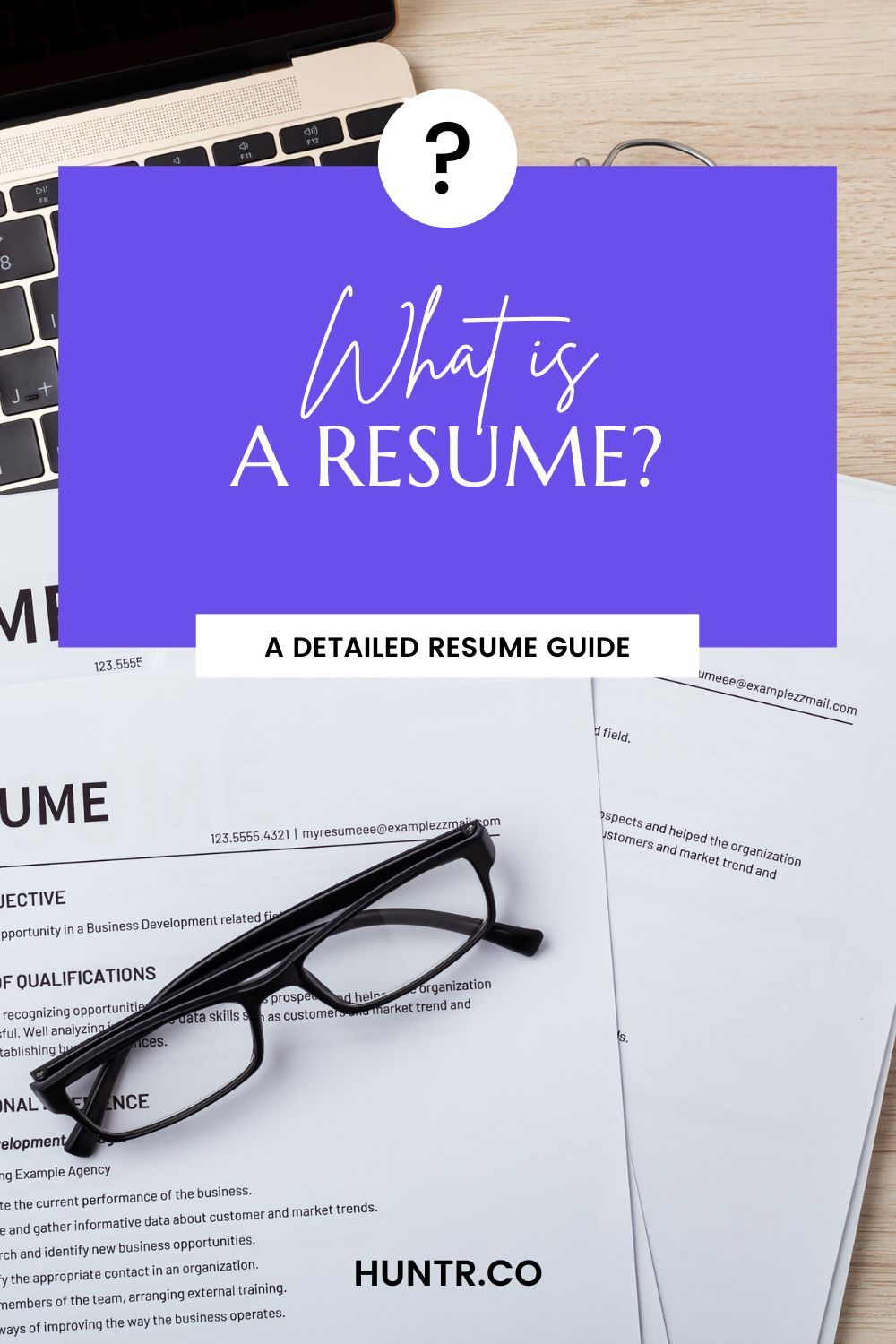Huntr Blog
What Is A Resume? (Definition, Types, Sections, Importance)
August 19, 2025
If you’ve recently started embarking on a job search, you might notice that job listings require a resume. If you’re new to the job hunt or have typically been hired from referrals or connections, you might not be familiar with what a resume is. This post will explain the resume definition, explore the types of resumes you can create, and the importance of creating a resume during the job search process.
Need to write a resume?
Sign up for Huntr to build your resume with a bit of help from AI to help you write one fast and without missing steps.
What is a resume?
A resume is a document that lists your contact information, your work history, education credentials, skills, and a resume summary. Those looking for a job will often be required to apply to a job listing with a resume. A hiring manager will accept resumes via their career website, a third-party website, or through social media, in particular LinkedIn.
Resume and CV
A resume and a CV also known as a Curriculum Vitae are not the same thing, despite people using them interchangeably at times. The documents have different lengths, purposes, focus of expertise, structure, and more. You can find more details about the comparison of the CV vs resume on our blog.
Types of resumes
1. Reverse-chronological resume
This is the most common resume format to use. And it’s the one hiring managers and recruiters prefer the most. A reverse chronological resume just means you list your work history from the most recent to the oldest. So, your last or current job would be included first. Then, you would include the role before that, and so on. The reason why this resume type is so common is because your accomplishments should be improving as you build your experience. So, naturally, your last job will have the most significant accomplishments on your resume.
2. Functional resume
A functional resume puts less emphasis on your work experience and more on your developed skills. This works best for those with career gaps, career changes, or new grads. It lists skills categories to highlight your abilities and achievements in these skills.
3. Combination resume
A combination resume is a mash-up of both reverse-chronological and functional resumes as the name suggests. You’ll include your most relevant work experience while also devoting a section to your skills. Both your work history and skills section will showcase why you’re qualified for a job. These days combination resumes work well to help you pass ATS-filters through relevant keyword matching while still showcasing that you do have the relevant work history to warrant serious consideration for the position you’re applying to.

Importance of creating a resume
1. You can’t get many jobs without one
In some cases, you can apply for jobs through your connections, particularly in construction or similar industries. However, for office jobs or for jobs that are highly sought after, you’ll need to write a resume to land a position there. Most jobs do require resumes and some even require cover letters too. Jobs often require a resume so they can learn more about you. It’s hard to know who you are without the context of your work experience and educational credentials. And when it comes to hiring people don’t want to hire just anybody, they want to hire the best. So, naturally, they read over resumes to determine whether or not you’re a good fit for a role.
2. It’s an employer’s first impression of you
A resume is an employer’s first impression of you. Provided that you applied online, you’ll likely have your resume scanned quickly by a hiring manager (usually they scan for only a couple of seconds). So, your resume needs to be impactful and scannable to help you better land your next role. You’ll want to use data like KPIs you achieved or tasks you completed, such as the number of projects you developed. Anything you can add to your resume that’ll make a positive first impression on your accomplishments, work ethic, and what you’re capable of doing will be key to helping you land that next role. So, having a good resume will ensure your employer’s first impression of you is favorable.
3. Helps you stand out in the job search
While it’s true that almost everyone will be handing in a resume when looking for a job, you can use your resume to stand out in the job search. After all, these are your list of greatest work accomplishments. What makes you unique? How are you the best hire for this position? Incorporating these answers into your resume through your big achievements will help you stand out. Instead of listing the duties and responsibilities you did, you share what you achieved in your previous roles. And by doing that you’ll be able to better stand out amongst other job seekers. The content of your resume does get read even if only for a short few seconds. So those accomplishments have to be big.
4. It highlights your skills
The importance of a resume is that it helps highlight your skills. Through your achievements, you demonstrate what you’ve learned and mastered over the years through your job. Your skills get added to your skills section, but they’re also showcased in your resume bullet points too. Showing your accomplishments proves that you’ve really honed in and learned the skills deeply to achieve a goal, huge target, or other accomplishment. Recruiters and hiring managers look through your resume to see if you have the skills required to do the job they’re hiring for. So, not only do you want to list the skills but you want to illustrate how you’ve mastered them.
5. Explains what you’ll offer employers
A resume details what you’ll offer employers. So, what are the skills, accomplishments, and work ethic you’ll be delivering when you start the role. A resume gives people a peek into what you’re capable of. If you have really outstanding accomplishments, employers will imagine the possibilities of hiring you on their team. It allows them to envision a brighter future at the company with you on board. A resume showcases how much effort you’ll put into a job by digging deep into what you’ve done in the past.
6. Can help you land an interview
And ultimately, the goal of a resume is to help you land an interview so you can eventually secure a job. If your resume is impressive to a hiring manager, they’ll call you or email you to let you know they’d like to chat further about your professional experience.

Who needs a resume?
A resume is needed by anyone looking for a job. If you’re planning to apply for a position online, you’ll need a resume to complete the application process. It doesn’t matter if you’ve been working for 25 years or are looking for your first job. You’ll likely need to present a resume to a hiring manager to be considered for a role. If you are looking to land a job by going to the business directly, you’ll likely hand in a resume in person. In general, a resume is the document you’ll need to create to be able to be considered for an interview.
Should you tailor a resume?
Yes, a resume should be tailored for the job. That means, every time you apply for a job you create a unique resume that's designed just for that role. Each job will have it's own qualifications, skills, and accomplishments needed to hire someone. They might have a very specific ask. If you send the same generic resume to everyone, you might miss out on a high-paying role you're qualified to do because you didn't make it obvious enough that you're the ideal fit. Your resume should only be one page in length, so tailoring your resume makes sure you only include the key and relevant details needed. Think creating a tailored resume is too much work? Fortunately, you can use Huntr's resume tailor to tailor your resume for a job. The tool highlights the skills and keywords you need to add to your resume with a little help from AI. It helps provide suggestions to make tweaking your resume for a specific job easy and fast.
Mandatory sections of a resume
1. Contact
The most important part of your resume is the contact section. While it doesn’t share the insights into your career, it does share how to reach you. If you don’t have a valid email address or phone number on your resume, you won’t get any call backs. So, double checking the information for accuracy is key. You’ll want to have a professional email address listed, such as your name with a number or two at the end in case you have a common name.
2. Summary
A resume summary is a one to two sentence summary about yourself and why you’re a great fit for the position. You want to highlight your main value proposition for why you should be considered for the role, although you never explicitly state that. For example, a resume summary might read, “Results-driven sales professional with over 10 years of experience. Proven track record of generating over $30 million in sales. Skilled at relationship building and closing deals through effective product-client fit.”
3. Work experience
Your work experience is the main focus of your resume. This is where you have to best sell yourself as the perfect candidate for a role. You’ll want to include your biggest achievements in all your roles. Focusing on achievements instead of duties will help ensure you showcase why you’re the most qualified candidate for a position. Include between 3-5 bullets per job, and include about three of your most recent and relevant positions. That’ll most likely keep the resume to one page. You don’t want to include your entire work history on your resume. And while one to two pages is standard for a resume, it’s best to keep it to one page.
4. Education
Including your education is crucial to showcase where you first learned the skills. For example, an engineer needs to include proof that they went to school for engineering and are qualified and legally allowed to work as an engineer. A doctor also needs to have graduated from medical school. So, including your education is important. If you’ve been out of school for over 10 years, you can remove your graduation year. Hiring managers do require certain certifications or degrees for certain roles, so having that education can help you land better positions.
5. Skills
While both your education and work experience will show how you developed your skills, it doesn’t hurt to include keywords in your resume. ATS filters resumes for keywords. So, with technology possibly rejecting your resume without anyone looking at it first, it’s crucial to ensure you add the relevant skills or keywords listed in a job listing to better pass the ATS filters so you can inch closer to landing that interview. There are resume tailor tools like Huntr that highlight the keywords in a job listing to allow you to add them to your resume in only a couple of clicks. Adding keywords of skills you’ve developed is a common practice and crucial so you can ensure your resume better aligns with what the hiring manager is looking for.
Tools for Building a Resume
1. Huntr
You can use Huntr to build your resume, review your resume, and tailor your resume all in one platform. You'll be able to add a resume photo depending on whether or not it's required for your country. You can choose from six beautiful templates so you can have a professional design that showcases your experience. You can also benefit from AI functionality that does quick edits or resume tailoring so you can apply to more places faster.
2. GitHub or Dribbble
Having a portfolio for your resume is important as it shows your collection of skills. If you're a developer, you'll likely have a GitHub account that details all your engineering work. If you're a designer, you'll likely use Dribbble. Adding these to your resume will help increase your chances of landing a role.
Optional sections of a resume
1. Certifications or licenses
Some jobs require specialized certifications or licenses to be able to perform required duties. For example, a nurse may be required to be certified in first aid, CPR, and so on. Mechanics often need ASE certifications. Servers and bartenders need certifications to be able to sell alcohol to others. You also need a specialized license to drive a forklift. So, depending on what job you’re applying for, you might need to list your certifications and licenses (and make sure they’re still valid).
2. Professional Headshot
While not always required, including a clean, professional-looking photo can help personalize your resume, especially in industries where personal branding matters, like marketing, media, or client-facing roles. If you don’t have access to a professional photographer, tools like AI Headshot Generator offer an easy solution. You can turn casual photos into polished headshots with professional backgrounds, lighting, and styling, perfect for resumes, LinkedIn profiles, and portfolios.
3. Languages
In some roles where being multilingual is necessary, you’ll want to list the languages you speak fluently. For example, in Canada some roles require employees to be bilingual in English and French. Alternatively, in some roles, such as Embassy offices, language schools, or community centers for ethnicities, you might be required to speak two languages fluently.
4. Awards
Have you ever won an award for something in your career? If so, you might add awards or honors on your resume to better stand out as a candidate.
5. Volunteer work
In cases where you’ve done relevant volunteer work, you might choose to list your work on your resume. This is more common for students and new grads with little work experience. It’s not as common to be used in working professionals. However, if you want to share some volunteer work on your resume to showcase your qualifications, you can list the achievements you’ve had in your volunteer experiences.
6. Publications
Have you ever had your work published online? If so, you can share links to the publications that either wrote about you or that you wrote for.
How to Format Your Resume
1. Consider Spacing
Because everyone tells you one page is the best resume length, people often try to condense their resume to make it fit one page. As a result, they'll make the margins small, decrease the font size, and use a skinny font just to make it fit on one page. Your resume should only include about three or four bullet points per role. Ensure you have one-inch margins. White space on a resume is a good thing. It's less overwhelming to the human reading it. So, cut out details that don't truly sell you when writing a resume. However, our data at Huntr shows that while a one-page resume is what people often try to create, the vast majority of job seekers actually create multi-page resumes. Executives sometimes have four-page resumes, not one. The more senior your experience, the longer the resume. So, while you still want to ensure you only include your best experiences, you can have a two-page resume without trying to force it onto one.
2. Choose readable fonts
The fonts you choose for your resume should be easy to read. Most people will stick with fonts like Arial, Times New Roman, Garamond, and so on. You either want a common sans serif font or a highly readable serif font. Avoid using cursive fonts. And definitely don't use Comic Sans. The font needs to be clean and professional. Avoid using narrow fonts to save space or wide fonts to make your resume look more detailed. Focus on adding or removing the relevant content instead.
3. Make it scannable
When you're still learning what a resume is, it's important to follow the common structure of a resume. You want to have clear headings, such as Work Experience, Awards, Education. You also want to have clear bullet points that make the resume scannable. You should aim to have one line per bullet point. Focus on being concise and saying what you need to say in a single line.
Should your resume be online?
Yes, having a LinkedIn profile where you share your work experience is a great practice. You can use Huntr's LinkedIn resume builder to transfer your LinkedIn profile and turn it into a resume. You'll be able to add or remove details with ease. Remember that even an online resume has people looking at it carefully. So be sure to update it regularly. Make tweaks to your profile. And have good online etiquette, as hiring managers will be able to see your comments online. You can also use Huntr to create a LinkedIn announcement post where you share your resume publicly. The feature removes your personal details allowing you to safely share your resume online without your personal contact details online.
Time to create a resume
Now that you know what a resume is, it’s time to craft your first resume. You can use a resume builder like Huntr to build your resume for the role you’re applying to. Huntr’s AI resume builder helps you craft your resume with step-by-step guidance and a little help from AI. It also includes a resume checker, which grades your resume to ensure you have all the relevant details needed. If you’re planning to create a resume, sign up for Huntr today!

Get More Interviews, Faster
Huntr streamlines your job search. Instantly craft tailored resumes and cover letters, fill out application forms with a single click, effortlessly keep your job hunt organized, and much more...
AI Resume Builder
Beautiful, perfectly job-tailored resumes designed to make you stand out, built 10x faster with the power of AI.
Next-Generation Job Tailored Resumes
Huntr provides the most advanced job <> resume matching system in the world. Helping you match not only keywords, but responsibilities and qualifications from a job, into your resume.
Job Keyword Extractor + Resume AI Integration
Huntr extracts keywords from job descriptions and helps you integrate them into your resume using the power of AI.
Application Autofill
Save hours of mindless form filling. Use our chrome extension to fill application forms with a single click.
Job Tracker
Move beyond basic, bare-bones job trackers. Elevate your search with Huntr's all-in-one, feature-rich management platform.
AI Cover Letters
Perfectly tailored cover letters, in seconds! Our cover letter generator blends your unique background with the job's specific requirements, resulting in unique, standout cover letters.
Resume Checker
Huntr checks your resume for spelling, length, impactful use of metrics, repetition and more, ensuring your resume gets noticed by employers.
Gorgeous Resume Templates
Stand out with one of 7 designer-grade templates. Whether you're a creative spirit or a corporate professional, our range of templates caters to every career aspiration.
Personal Job Search CRM
The ultimate companion for managing your professional job-search contacts and organizing your job search outreach.

